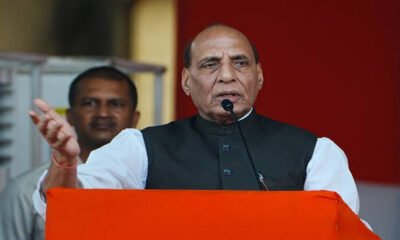National
Climate Change: It’s time the human race started dealing with it or perish
Isha Singh.
Little girl Vasu, aged eight, dreamt of becoming a pilot one day. She wanted to study well and make her parents proud. But one fateful day in 2013, the cyclone Phailin ruined her home and broke her family. Her dreams, just like her home, laid in ruins. She has been a victim of Climate Change.
In another incident, in the faraway hinterlands of Vidarbha region of Maharashtra, Baswant Rao is mired in deep debt. He is hoping against hope to have a bumper crop this season so that he can pay off his debts. As fate would have it, Monsoons refused to visit his farms and his crops died a slow death, leaving his family in dire misery. Rao, too, is a victim of Climate Change.
Like Vasu and Rao, Climate Change is wreaking havoc in millions of lives and is leading to destruction of our planet. It has become the greatest challenge to the survival of future generations, which calls for a careful analysis of the problem.
Definition: Climate Change refers to the long term alterations in weather, temperature and rainfall patterns. There is a strong scientific consensus that this change is purely driven by human actions. The trend for the past century has been unmistaken – the temperatures are on the rise, erratic rainfall patterns, and the majority of the land is increasingly under the threat of desertification and loss of biodiversity.
No clear word by UPSC on deferment of Civil Services prelims date
A daunting challenge
So what are the reasons and consequences of climate change?
Social Factors: One of the prime reasons that contribute to climate change is poverty and deprivation. Without adequate resources and means, the poor are compelled to adopt unsustainable practices. For example, slash and burn agriculture is prevalent in most of the tribal areas in India because they do not have access to fertilizers, farm equipment and weedicides. Similarly, the poor openly defecate because of lack of access to toilets. From a nation’s perspective too, developing nations such as India, Nigeria contribute to climate change because of the absence of technology transfer from developed nations. This had led to an unprecedented challenge to our biomes.
As temperatures rise consistently, it is leading to desertification of farm lands and depletion of the ground water table. UN Agencies estimate that by 2030, almost 60% of productive landmass faces the threat of desertification. This poses a serious question on Viability of Food Chains, thus posing a risk to future generations. In the same vein, as the glaciers melt at the poles, water levels are rising to unprecedented levels – putting island nations such as Pacific Island Nations, Maldives at the risk of complete submergence. Scientists project that the future refugee crisis will not be due to wars but due to climate change. If the Syrian Refugee crisis tells us anything, it is that such unprecedented displacement of people is a major threat to social order & global peace in future.
How feasible is the Cashless Economy In India?
Economic Factors: On the economic front, unfettered Consumerism, Globalization, and blind pursuit of development are posing severe threat to future generations. Consumerism is the dogma that tells us to consume and buy more than our needs. Global retail chains such as Amazon, Walmart, KFC, etc. have made more & more people part of this Consumerism frenzy. It leads to severe strain on earth’s resources, and irredeemably pollutes its ecosystem through generation of waste. To illustrate, every year, an area equivalent to the State of Maharashtra is cleared in Amazon Forests to cater our ‘needs’. As forests are cleared and ecosystems disrupted, it disturbs the carbon sink of the earth. Thus, we fall into the inevitable vicious circle of lack of Carbon sinks leading to further rise in Carbon Dioxide, thus leading to climate change and global warming. With increased levels of CO2, unchecked mining, we are witnessing rise in inequality and pollution levels in the atmosphere and marine ecosystem. For instance, today, New York Square consumes more electricity in one week than Zimbabwe alone does in a whole year. Also, the inevitable rise of respiratory diseases, lifestyle diseases are posing a major threat to public health.
Ethical Factors: Climate Change is also driven by being unethical. MK Gandhi famously said that “Our Earth is not an inheritance from our ancestors, but a loan from future generations”. But what ethical examples are we setting for our future generations?
Industrial farming of animals is one of the major drivers of climate change. Millions of gallons of water and thousands of acres of food are being used not to feed the hungry, but to raise animals and slaughter them later. Intensive farming strips the agricultural land of its life, rendering it useless for future generations. With erratic climate patterns, rainfall and storms are becoming the norm. Such practices are vulnerable to destruction, thus threatening not only us but also the future.
Zoom app is a threat to the privacy of individuals, warns the MHA
International Factors: Climate change is a global phenomenon and no one nation can solve it. However, ever since the world came together at Rio in 1992 to draft the UN Convention on Sustainable development and subsequent climate protocols such as Kyoto, Montreal, etc., the contribution of developed nations has been found wanting. The USA, world’ biggest polluter, never signed the Protocol and also pulled out of the Paris climate Agreement later. The UN Climate fund of $100 Billion to be transferred to developing nations never took off. This stubborn attitude of developed nations is posing a major challenge to the future. Why Developing nations are punished for what is largely a contribution of developed nations? Such an impasse, therefore, has the potential to debase the international community’ ability and will to take on climate change.
Having discussed how climate change is posing a major challenge to the future, let’s turn our attention to how best we can solve it.
The world has a human development Index and a Happiness Index. What we need right now is a Sustainable Living Index. People must be made aware of their lifestyle’s impact on the ecosystem (Carbon Footprint) so that they live their life characterised by 3Rs – Reduce, Reuse, and Recycle.
Here is the list of new MHA guidelines for Lockdown 2.0
There must be a worldwide movement to educate people on climate change and practices they can adopt to mitigate it. Innovative measures such as Vertical Farming (Growing plants on buildings), using energy efficient buildings, switching to electric vehicles and Solar energy can go a long way in making our lifestyles sustainable.
Finally, the international community must recognize the core principle of equitable climate emission norms, that is – Common but Differentiated responsibility and obligation to transfer clean technology to developing and least developed countries. India must do its part in meeting emission norms as per our INDCs (Intended Nationally Determined Contribution through effective implementation of National Solar mission, National Mission on Electric Mobility and promoting sustainable agriculture practices.
The nations of the world have come together before to abolish practices such as slavery and collaborated in declaration of human rights for all. To meet the challenge of climate change, the need is now more than ever for the world to collaborate and ensure that we leave a planet to our future generation that is better than what we have inherited. Only then we can ensure that millions like Vasu and Rao have means to live a life of their choice and dream.























